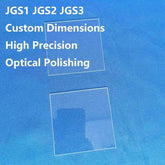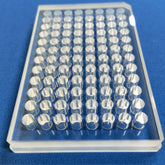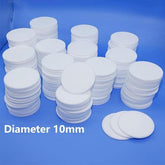Advantages and disadvantages of quartz glass products
- Advantages
(1) High transparency
Quartz glass exhibits a remarkably high degree of transparency and light transmittance, reaching levels comparable to those observed in optical grade glass, with a transmittance exceeding 90%. These characteristics of quartz glass render it suitable for utilization in the fabrication of optical instruments, laser apparatus, fibre optic communication systems and other fields of advanced technology.

- Hightemperature resistance
Quartz glass is characterized by a high melting point, reaching up to 1710 degrees Celsius, and demonstrates excellent high-temperature resistance, which permits its utilization in the fabrication of high-temperature stoves, quartz boats and other equipment capable of withstanding high temperatures.
- Corrosion resistance
Quartz glass exhibits excellent corrosion resistance and high resistance to a wide range of acids, alkalis, salts, and other chemicals. This characteristic enables quartz glass products to be used in the fabrication of corrosion-resistant apparatus, including chemical laboratory apparatus and chemical pipes.

- High purity
The purity of quartz glass can reach a level exceeding 99.95%, with an extremely low impurity content, which enables quartz glass products to be used in the fabrication of high-purity experimental apparatus and analytical instruments, among other applications.
- Good electrical insulation performance
Quartz glass exhibits favourable electrical insulation properties, rendering it suitable for utilization in a multitude of fields, including electronics and electrical appliances.

- Disadvantages
- Brittleness
Quartz glass is characterized by a high degree of brittleness, rendering it susceptible to fracture when subjected to external forces or temperature fluctuations. This presents a challenge to the use of quartz glass in certain applications, such as mobile phone screens.

- Processing challenges
Quartz glass is a highly hard material that is challenging to process and carve, resulting in high manufacturing costs for quartz glass products. Additionally, it necessitates sophisticated processing equipment and technology to meet the high requirements for production.
- Susceptibility to scratches
The surface of quartz glass is susceptible to the formation of scratches, which can have a detrimental impact on its visual appearance and functionality. It is therefore imperative to ensure the protection of the surface of quartz glass products.

- Sensitive to ultraviolet light
Quartz glass exhibits high transmittance to ultraviolet light, but prolonged exposure to ultraviolet radiation may result in a decline in its performance. This restricts the utilization of quartz glass products in ultraviolet environments.
In conclusion, the quartz glass product exhibits a multitude of advantageous characteristics, including high transparency, high temperature resistance, corrosion resistance, high purity and favourable electrical insulation properties. However, it should be noted that quartz glass also has certain disadvantages, including brittleness, processing difficulty, susceptibility to scratches and sensitivity to ultraviolet light. The prospective expansion of the range of applications for quartz glass products will be facilitated by the continuous optimization of processing technology and techniques.






